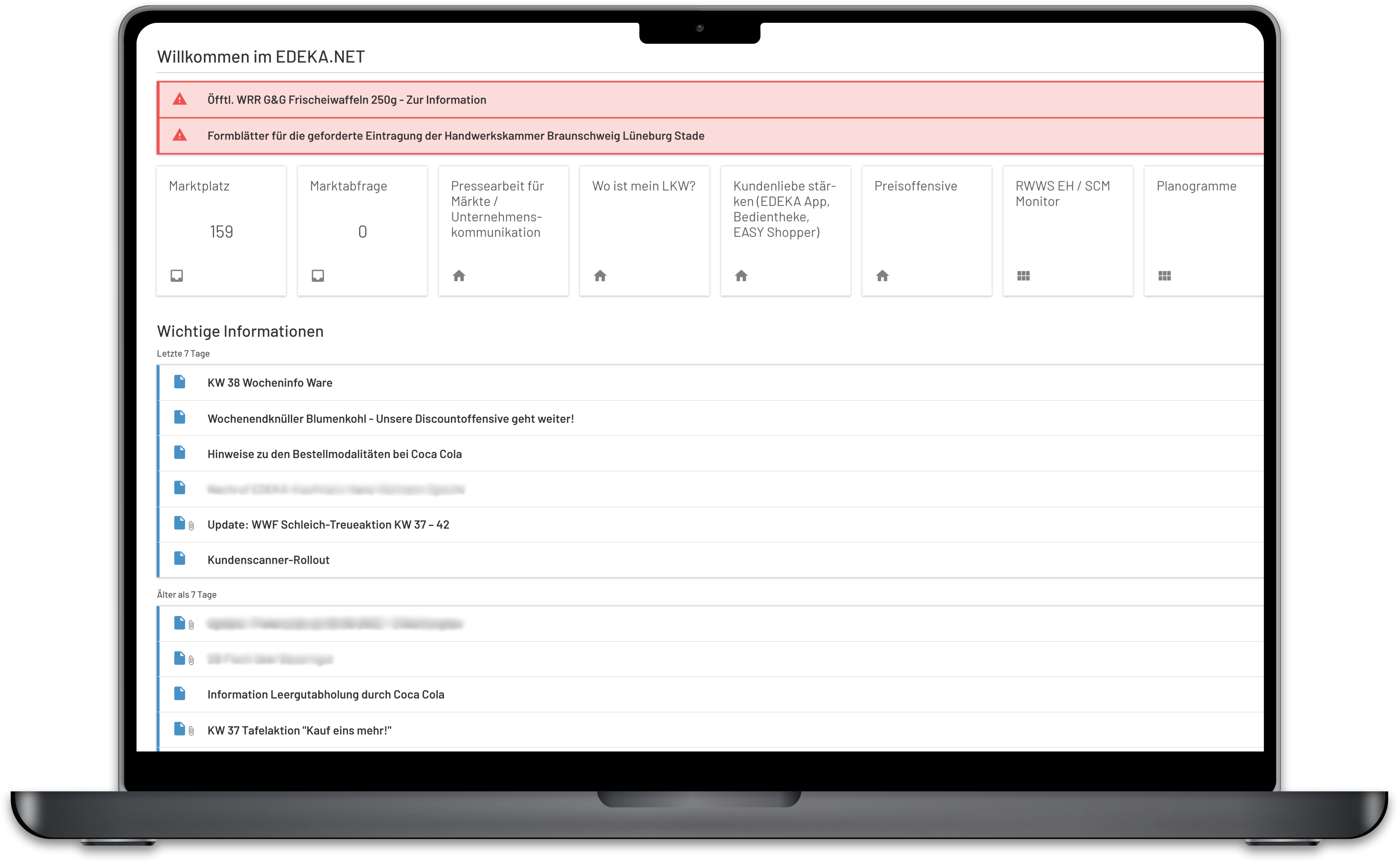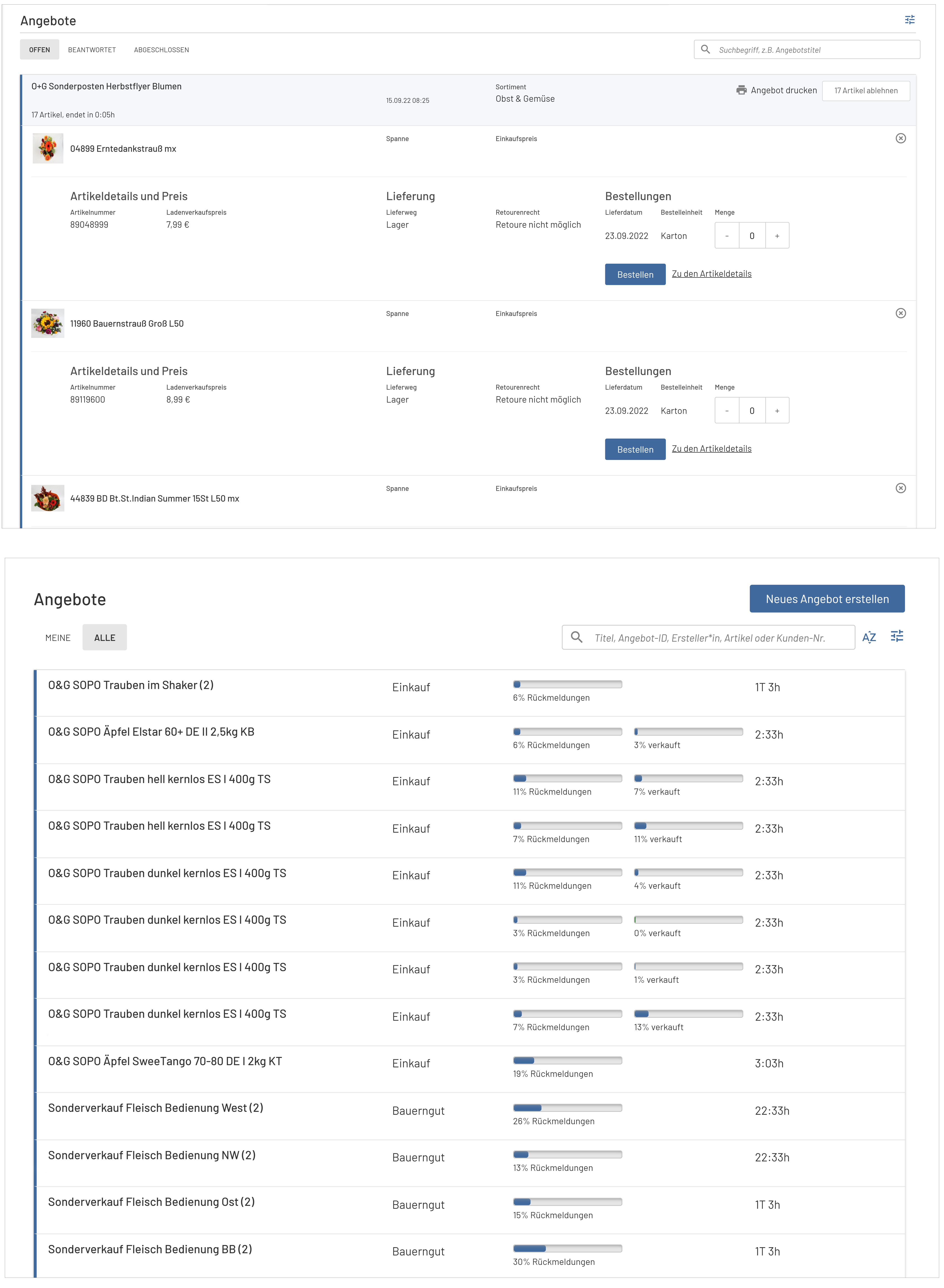
Diese Case Study ist auch auf Deutsch verfügbar
Everyone has probably been to an EDEKA store at some point. What many take as a large supermarket chain is in reality a consortium of independent merchants that have organized themselves across Germany into seven regional cooperatives. These regional cooperatives then internally guide the strategic orientation as well as supporting key purchasing, logistics, production, expansion, and sales activities of the retailers. EDEKA Minden-Hanover, with over 1,500 stores, enjoys the highest sales of the seven regional cooperatives. The demands on the centrally managed IT services used throughout the entire sales region are correspondingly complex: smooth procedures that everyone can understand are essential, as are an informative structure and forward-looking technologies.
The specific objective was to develop a portal for communication between the EDEKA Minden-Hanover regional cooperative and the retailers. User-friendly operation is a particularly important aspect: The provided information, such as regarding current sales campaigns or urgent notifications in the event of a product recall, must be discovered quickly and easily. This is precisely where the platforms implemented in previous attempts fell short. In other words, it was time for a change. And to avoid the mistakes of the previous versions, the retailers – as the end users – were involved in the development of the new portal from the very start.
In cooperation with an external consulting company and a select group of retailers, a UI concept was initially created internally within EDEKA. The search for a suitable partner for the corresponding architecture eventually brought INNOQ into play. The actual objective eventually expanded over the course of the project well beyond the architecture itself and became increasingly complex.

Flexibility in architecture and implementation
After initial workshops with small and large groups, self-contained systems (SCS) were selected as the suitable architecture model. These relatively small software systems, which each depict a single use case of the communication platform, were to collectively form an overall logical system. The advantage of this approach is that the small, mutually independent systems can be developed and put into production more quickly. This was an important requirement since the platform was to be continuously expanded with new information offerings.
INNOQ took over the conceptual design as well as the development work. The development team at INNOQ initially consisted of five persons working nearly independently together with the EDEKA product owner. The team was later expanded with up to six employees from the EDEKA internal development department. The work on the individual self-contained systems takes place in small, mixed teams. The collaboration is entirely remote – an approach that has proven itself from the start.
Information plus interaction
The system has been in production since 2018. Nevertheless, the feedback of the retailers is still regularly solicited. This user-centric method yielded and continues to yield new, important use cases that inform the continued development.
The focus at the start of the project was on the distribution of information. In other words, it was initially a communication tool between the wholesale (regional cooperative) and retail sides of the business in order to share important information and updates and to check whether important messages were actually read. For example, this could involve product recalls or new prices, as well as information about marketing campaigns or recipes for the salad counter. The previous versions of the portal also served this function. However, users found it difficult to orient themselves within the wealth of information consisting of Word and PDF files. There was neither an editorial backend nor a content management system.
By relying on INNOQ, EDEKA.NET developed into a universal application platform for various applications serving as interfaces between wholesale and retail.
Sascha LaßProject lead IT
The current, fully redesigned portal serves up information on websites generated in the CMS. This not only ensures that they are better presented and more suitable to the target group, it also makes access and user navigation considerably simpler. There are a number of smaller conveniences as well: For example, it is possible to set favorites and look up addresses. Plus, the store managers can set which topics their employees can view. In this way, what was initially an informational tool developed into an organizational tool for work at the store itself.
One marketplace for retail and wholesale
Already during creation of the initial concept, however, it was clear that the portal should not be restricted merely to distributing information. The intention was rather to develop it gradually into a platform for interaction between the wholesale and retail organizations within EDEKA. The architecture proved itself well here, since all the new, interactive functionality could be easily integrated into the portal.

One such interaction between retail and wholesale takes place within the framework of the new marketplace functionality. Wholesale configures products, which can be accessed by the retailers and ordered for their stores. This is especially practical and effective when EDEKA wishes to market products in a special sale campaign. In such cases, it is important for the retailers to order as many of these products for their stores as possible. The marketplace functionality has now become at least as important as the pure distribution of information.
Other applications that were added to the portal:
- Where is my truck: With this function, retailers can track the status of their wholesale delivery.
- Expanded recipe function: The recipe collection was expanded with a search function that allows searching for recipes by specific criteria, such as degree of difficulty, seasonal dishes, or specific ingredients (including article numbers).
- Training programs: Management and documentation of training programs in the individual stores
- Feedback and complaints: A tool for recording received feedback and complaints

Well-informed – wherever and whenever
To ensure that the store employees can access the functions as easily and flexibly as possible, the portal can be used from a desktop computer or via a web app. This means that the employees in the produce department can stay informed on mobile devices without having to interrupt their work for too long. However, this does require that they actively load new content. To improve the flow of information, it was decided that news should be sent to the employees via push notifications. From a technical perspective, this was best achieved with a mobile app.

The development was handled by a small team of INNOQ consultants. Once again, self-contained systems were selected for the architecture model. This made it possible to develop the mobile app and get it into production independently of the overall system.
Alongside the primary use case of promptly publishing news to employees via push notifications, the app also has additional features: For example, the employees can assemble a personalized newsfeed by subscribing to topics of relevance to them, such as produce or dairy products.
Technical highlights
- NodeJS (JavaScript)
- Java, Spring Boot
- Simple integration between the self-contained systems via REST and feeds
- No UI framework; instead, a ROCA approach is used that aims for a very consistent UI
- Specially created pattern library, which is used in all self-contained systems
- Elasticsearch as search index
- Operation of the systems on Amazon Web Services (AWS)
- PostgreSQL
- MongoDB
